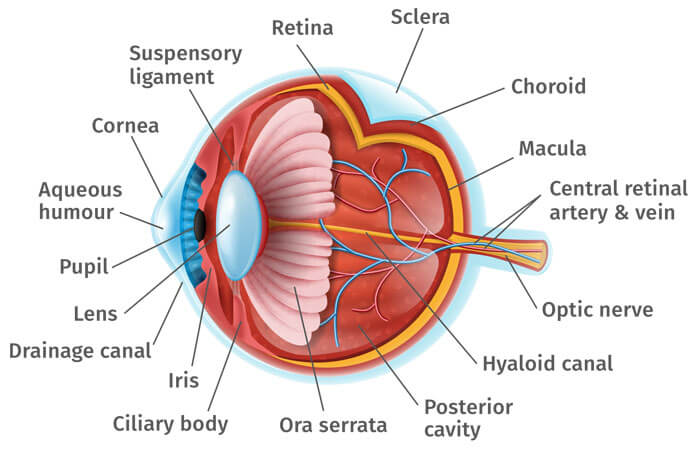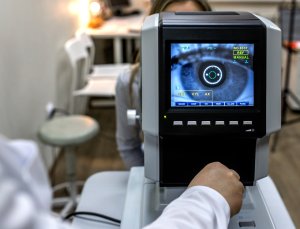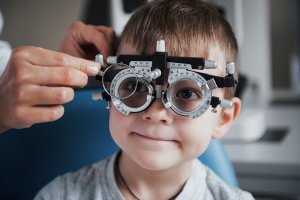Learn more about diabetic eye care
What is diabetic eye care? Symptoms, treatment options and more!

At a Glance:
Things to know and remember:
- Diabetic eye disease comprises a group of eye conditions that affect people with diabetes. These conditions include diabetic retinopathy, diabetic macular edema (DME), cataract, and glaucoma.
- All forms of diabetic eye disease have the potential to cause severe vision loss and blindness.
- Diabetic retinopathy involves changes to retinal blood vessels that can cause them to bleed or leak fluid, distorting vision.
- Diabetic retinopathy is the most common cause of vision loss among people with diabetes and a leading cause of blindness among working-age adults.
- DME is a consequence of diabetic retinopathy that causes swelling in the area of the retina called the macula.
- Controlling diabetes—by taking medications as prescribed, staying physically active, and maintaining a healthy diet—can prevent or delay vision loss.
- Because diabetic retinopathy often goes unnoticed until vision loss occurs, people with diabetes should get a comprehensive dilated eye exam at least once a year.
- Early detection, timely treatment, and appropriate follow-up care of diabetic eye disease can protect against vision loss.
- Diabetic retinopathy can be treated with several therapies, used alone or in combination.
About Diabetic Eye Disease
What is diabetic eye disease?
Diabetic eye disease is a group of eye conditions that can affect people with diabetes.
Diabetic retinopathy is the most common diabetic eye disease. Diabetic retinopathy affects blood vessels in the light-sensitive tissue called the retina that lines the back of the eye. It is the most common cause of vision loss among people with diabetes and the leading cause of vision impairment and blindness among working-age adults.
Diabetic macular edema (DME). A consequence of diabetic retinopathy, DME is the build-up of fluid (edema) in a region of the retina called the macula. The macula is important for the sharp, straight-ahead vision that is used for reading, recognizing faces, and driving. DME is the most common cause of vision loss among people with diabetic retinopathy. About half of all people with diabetic retinopathy will develop DME. Although it is more likely to occur as diabetic retinopathy worsens, DME can happen at any stage of the disease.
Diabetic eye disease can also include cataract and glaucoma. Adults with diabetes are 2-5 times more likely than those without diabetes to develop cataract. Cataract also tends to develop at an earlier age in people with diabetes. With glaucoma, diabetes nearly doubles the risk of glaucoma in adults.
All forms of diabetic eye disease have the potential to cause severe vision loss and blindness. That’s why early diagnosis and treatment are always the best options for diabetic patients. In fact, because diabetic eye disease often goes unnoticed until vision loss occurs, people with diabetes should get a diabetic eye exam at least once a year.
Symptoms
What are the symptoms?
The early stages of diabetic retinopathy usually have no symptoms. The disease often progresses unnoticed until it affects vision. Bleeding from abnormal retinal blood vessels can cause the appearance of “floating” spots. These spots sometimes clear on their own. But without prompt treatment, bleeding often recurs, increasing the risk of permanent vision loss. If diabetic macular edema (DME) occurs, it can cause blurred vision.
Treatment Options
What are my treatment options?
Treatment options depend upon the nature of the diabetic eye disease but can include medications, laser, and sometimes surgery.
If early nonproliferative diabetic retinopathy is present, treatment of the eye may not be necessary if blood sugar is well maintained. If severe nonproliferative or proliferative diabetic retinopathy is present, laser procedures, surgeries, or injectable medications are available and may reverse, slow, or stop the progression of diabetic retinopathy.
Based on your vision diagnosis during examination, our diabetic eye care specialists will discuss with you the most appropriate treatment options.
Take the first step
If you have diabetes, a careful, comprehensive eye examination by one of our diabetic eye specialists is the first step. Our doctors use very specialized technologies — and years of training and experience — to examine your eyes and check for the presence of disease. At your examination, your doctor will personally discuss with you the health of your eyes, how your condition is affecting your vision and what treatment options are available. The bottom line: trust the experts. Insist on Eye Consultants of Pennsylvania.
Does my insurance plan
cover my eye care?
Find out what insurance we accept and what is covered by insurance.
Learn more about our diabetic eye care specialists
Physician information including education, training, practice location and more.
Schedule an Appointment
Schedule an appointment with one of our specialists.





